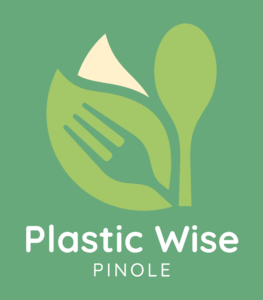SINGLE-USE PLASTIC REDUCTION IN PINOLE
Welcome to Pinole’s Single-Use Plastic Reduction Ordinance website—a resource designed to empower businesses and residents with the information and tools needed to take action. Adopted in 2024 and effective January 1, 2025, the Single Use Plastic Foodware and Bag Reduction initiative aims to protect our environment and community health by eliminating single-use plastics in retail and food services—learn how businesses and residents can comply, participate, and support a sustainable future for Pinole!
This website is constantly growing with new resources and tools to support you. Check back often to discover the latest updates and assistance!

Why this Ordinance?
Single-use plastics pose significant environmental and health risks. Disposing of plastic items after a single use is unsustainable, straining our planet and impacting our health. These plastics litter Pinole’s natural spaces, overload our landfills, and depend on non-renewable resources.
Consider this:
- A trash survey of our beloved Pinole Creek found single-use food packaging as the major pollutant.
- A 2011 Bay Area litter survey showed that 67% of all trash collected was from take-out food and beverage packaging.
- Microplastics can be found in our bloodstream.
- 85% of plastic ends up in landfill which can leach harmful chemicals into groundwater.
- 561 billion disposable items are used in the United States each year.
- Eating from plastic foodware increases health risks.
To address these concerns, the City of Pinole adopted the Single-Use Plastic Reduction Ordinance in September of 2024. The ordinance takes effect on January 1, 2025, with enforcement starting on July 1, 2025, allowing a six month transition period for businesses to adapt.


How to File a Complaint
If you observe a business in Pinole that may not be complying with the City’s Single-Use Plastic Reduction Ordinance (Municipal Code Chapter 8.38), you may submit a complaint through the City’s Code Enforcement system.
To report a concern about a business potentially using prohibited plastic foodware or bags, automatically providing single-use items, or failing to provide required waste receptacles, please follow the instructions on the Code Enforcement: How to File a Complaint page.
You may also contact the Sustainability Division with questions or to request support:
Kapil Amin
Sustainability Project Manager
Email: kamin@pinole.gov
Phone: (510) 372-0989
Please provide the following information, if available:
- Business name and address
- Date and time the issue was observed
- Description of the potential violation
Complaints may be submitted anonymously. However, providing your contact information is encouraged in case staff need to follow up.
What to Expect After Filing a Complaint
The City uses a complaint-based, education-first approach to enforcement. Once a complaint is received:
- Sustainability staff will conduct a site visit to speak with the business, provide educational materials, and develop a compliance plan.
- The business will be given 14 calendar days or more if appropriate to comply or to request a waiver or time extension.
- If the business does not respond or correct the issue, the case may be referred to Code Enforcement for formal follow-up.
This process is designed to support businesses in transitioning away from single-use plastics while ensuring fair enforcement of local law.
Common Types of Violations
Examples of potential violations of the ordinance include:
- Providing plastic utensils, straws, or condiment packets without customer request
- Using non-compostable or non-recyclable takeout containers
- Distributing plastic carryout bags at checkout
- Using bags that don’t meet labeling, durability, or recycled content standards
- Not charging the required fee for checkout bags
- Failing to post required signage about accessory items
- Not providing separate waste bins for compost, recycling, and landfill
Information for Businesses (Technical Assistance Request Form HERE)
- Retail Businesses: Must stop distributing disposable plastic bags. If using paper or fiber bags, they must be 100% compostable or recyclable and include a minimum 15-cent fee per bag.
- Food Service Businesses: Must stop using petroleum-based or compostable plastic foodware (e.g., bioplastics, PLA) and switch to compostable options made from natural fibers (such as wood, bamboo, or paper). Reusable foodware is strongly encouraged for dine-in services.
To support local businesses in this transition, free technical assistance resources will be available to all businesses in Pinole, including cost-saving solutions, inventory conversion guidance, distributor connections, and waiver assistance. This ordinance is part of the City’s commitment to reducing waste, promoting sustainable alternatives, and protecting the health of our community and environment.
Explore the resources on this page to learn more about compliance and the support available to businesses as we move toward a greener future for Pinole.
Request FREE Technical Assistance to Comply with the Ordinance! (Prerequisite for waivers and extension of time)
Resources for Businesses
Frequently asked Questions from Businesses
When does the ordinance take effect, and when will enforcement begin?

The Single-Use Plastic Reduction Ordinance takes effect on January 1, 2025, with enforcement beginning on July 1, 2025. This six-month transition period allows businesses to adapt and find compliant materials.
Who does this ordinance apply to?

The ordinance applies to all food service establishments, retailers, caterers, food trucks, private schools and any person or organization using city facilities or operating at city-sponsored events. The city itself is also required to comply with these rules, ensuring sustainable practices across all operations.
What types of disposable foodware are restricted?

Businesses must use foodware that is compostable, unbleached, and free from fluorinated chemicals like PFAS. Items such as plastic cutlery, cups, plates, and takeout containers made from petroleum-based plastics and bioplastics (e.g., PLA) are not permitted. Acceptable materials include natural fibers like wood, bamboo, and paper. Foil to wrap and form food is allowed.
Are disposable utensils, straws, and other accessories automatically provided with takeout?

No, disposable foodware accessories (e.g., utensils, straws) may only be provided upon request or by self-service stations. This includes all ordering platforms, whether digital, phone, or in-person, as required by state law. Additionally, utensils cannot be bundled and/or wrapped.
As a business, can I charge a fee for compliant foodware or bags?

Yes, businesses may apply a surcharge for disposable foodware to help offset compliance costs. Retailers must charge a 15-cent fee for qualifying single-use bags, but food service businesses have the option to charge or not charge this fee at their discretion. All surcharges must be clearly communicated to customers and itemized on receipts.
How do I apply for a waiver if compliance creates financial hardship?

Businesses may apply for a waiver if they can demonstrate that no compliant items with similar utility are available or if compliance would cause undue financial hardship. However, waiver applications may only be submitted after a business has requested and received free technical assistance from the City, which includes sourcing guidance and other support.
Are there resources available to help businesses comply?

Yes, Pinole offers free technical assistance, including a compliant product sourcing guide, inventory conversions, distributor connections, cost-effective solutions (integrating reusables, optimizing packaging, community bargaining, etc.), and waiver support. The city will also maintain a resource listing businesses that encourage reusable options, helping you attract sustainability-minded customers.
What records do I need to keep for compliance?

Each business must maintain written records evidencing compliance with the ordinance. These records should be readily available for inspection by the city if requested.
What are the bag requirements under this ordinance?

Disposable bags must meet specific standards, such as being unbleached, made from at least 40% post-consumer recycled content paper, or plant starch-based. All qualifying single-use bags must include a minimum 15-cent fee for customers (excluding certain food service bags where the fee is optional).
How can my business promote reusable options to customers?

Encourage customers to bring their own reusable bags, containers, and utensils for a more sustainable experience. Technical assistance services will offer a brief tutorial on properly accepting customer brought cups and containers in accordance with AB 619. Pinole is creating a resource repository to highlight businesses that actively encourage reusables, supporting both compliance, customer loyalty, and savings for your business.
Is the mandatory 15-cent surcharge fee for retailer bags subject to sales tax?

From the California Department of Tax and Fee Administration:
The minimal amount required to be charged by retailers when they provide their customers with certain carryout bags is not subject to tax and should not be included in the retailer’s gross receipts for sales tax reporting purposes, even when itemized on receipts.
As required by state law, retailers who provide their customers a reusable grocery bag or a recycled paper bag must charge an amount not less than 10 cents per bag. Local laws may require the retailer to charge its customer a different amount per bag. This charge is imposed upon the customer. As such, this charge is not included in the seller’s gross receipts and is not subject to sales tax.
Header text
Apply for a waiver (for businesses looking for partial waivers on item(s) due to performance, cost, supply chain availability, etc. )
Apply for an extension of time (for qualifying businesses looking for more time to comply with ordinance requirements)
Information for Customers
- Bring Your Own Bag: A 15-cent charge will apply for disposable paper and fiber bags at retail stores.
- Bring Your Own Reusables (at participating locations): Bringing your own reusable utensils, cups and containers is encouraged.
- Know Your Compostables: Stay mindful of what goes in your compost bin for cleaner, greener disposal; avoid bioplastics as they are not compostable
- Restaurant Surcharge: Restaurants may apply a small surcharge for packaging—another great reason to bring reusables!
Frequently Asked Questions from Customers
Why did Pinole adopt a Single-Use Plastic Reduction Ordinance?

The ordinance aims to reduce plastic pollution, improve environmental health, and reduce waste in landfills by limiting single-use plastics in food service and retail.
What restrictions does the ordinance place on single-use plastic foodware items?

The ordinance prohibits restaurants, caterers, and any food providers using city facilities from using single-use plastic foodware items, such as plates, cutlery, cups, and containers. The city itself is also required to follow these rules. Businesses and event organizers must use unbleached, PFAS-free compostable foodware made from natural fibers, like wood, bamboo, or paper (compostable plastic is not allowed). Foil to wrap and form food is permitted. Some businesses may charge a small fee to help offset the cost of compliant materials, which will be clearly communicated to customers.
Will I still be offered a disposable bag at stores in Pinole?

Yes, disposable bags are still available, but they must meet specific compostable or recyclable standards, and a minimum 15-cent fee will apply.
Are disposable utensils, straws, and other accessories automatically provided with takeout?

No, disposable foodware accessories (e.g., utensils, straws) may only be provided upon request or by self-service stations. This includes all ordering platforms, whether digital, phone, or in-person, as required by state law. Additionally, utensils cannot be bundled and/or wrapped.
Can I bring my own reusable containers or bags?

Yes, customers are encouraged to bring their own reusable bags at all retail businesses and food containers at participating food businesses, as long as they are clean and suitable for food safety. The City will maintain a directory of where reusable containers at this website are accepted.
How can I report a business or event that is not following the ordinance, and when will enforcement begin?

Enforcement of the ordinance begins on July 1, 2025, after a six-month transition period. You can report non-compliance through the city’s complaint submission portal, which will be available on Pinole’s website.
How can I help reduce single-use plastics?

You can support the ordinance by bringing your own reusable bags, containers, and utensils when shopping or dining out where accepted. The city is creating a resource repository for businesses that encourage the use of reusables, making it easier for you to find and support establishments committed to sustainability
Are there exceptions for low-income residents regarding bag and foodware fees?

Yes, customers using EBT or WIC benefits are exempt from disposable bag and foodware fees at the point of sale.




